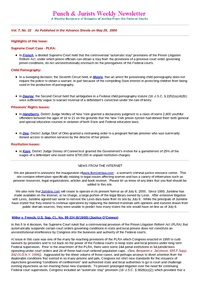Loaded on
July 1, 2000
published in Punch and Jurists
May 29, 2000
In 1994 an officer of the Connecticut Department of Environmental Protection approached the defendant’s car in a state park and found him in possession of thirteen “unbound pictures” of unclothed minors. Four years later a Federal grand jury returned a one-count indictment, charging the defendant with possession of child …
Loaded on
May 1, 2000
published in Punch and Jurists
May 29, 2000
Approximately a year after the defendant in this case was sentenced, District Judge Piersol of South Dakota, upon a motion of the Government, filed an amended judgment adding two conditions of supervised release. Specifically, the court ordered: “(1) Kent shall have no contact, in person or otherwise, with his …
Loaded on
May 1, 2000
published in Punch and Jurists
May 29, 2000
In this case the en banc court declined to rehear the panel's original decision reported at 200 F.3d 401 (See P&J, 2/21/00) to allow the defendant to join a co-defendant's motion to unseal material with respect to a claim of jury tampering.
Loaded on
May 1, 2000
published in Punch and Jurists
May 29, 2000
In this case, the plaintiff, a prisoner who was incarcerated and serving an eighteen-month sentence, requested access to an abortion. The prison denied her request and stated that it would not would provide such access without a court order. The plaintiff thereafter filed a motion for a temporary restraining …
Loaded on
May 1, 2000
published in Punch and Jurists
May 29, 2000
The defendant in this case was tried and convicted on a number of Federal counts after he had previously been tried and acquitted of charges relating to the same conduct in a State court. He appealed, arguing that the Federal prosecution on charges for which he had previously been …
Loaded on
May 1, 2000
published in Punch and Jurists
May 29, 2000
In this case, an inmate and her husband had brought an earlier proceeding against prison officials seeking injunctive relief to require them to allow the husband to attend the birth of their child. The prison responded by stating that permission to have her husband present would be granted as …
Loaded on
May 1, 2000
published in Punch and Jurists
May 29, 2000
In this case the Court rejected the defendant's claim that the Government's "bargain basement pricing and generous consignment policy" constituted sentencing factor manipulation - although it did not reject that defense in toto.
In this case, the defendant argued that the government's "bargain basement pricing and generous consignment …
Loaded on
May 1, 2000
published in Punch and Jurists
May 29, 2000
In a broad decision that could have a huge financial impact on many municipalities, District Judge Motley granted declaratory judgment, under 28 U.S.C. §§ 2201 and 2202, to a class of plaintiffs who brought suit against the New York Department of Corrections (DOC), the New York City Board of …
Loaded on
May 1, 2000
published in Punch and Jurists
May 29, 2000
This case deals with a topic that is destined to become increasingly important to criminal defendants following their release from imprisonment: namely, the right of the Government to pursue defendants who have failed to pay fully their restitution obligations during their terms of supervised release or probation.
In the …
Loaded on
May 1, 2000
published in Punch and Jurists
May 29, 2000
Here the Court held that an arrest for possessing child pornography does not require the police to obtain a warrant, in part because of the "compelling state interest" in protecting children from being used in the production of pornography.
In this case the Seventh Circuit issued a sweeping …
Loaded on
May 1, 2000
published in Punch and Jurists
May 29, 2000
In this 5 to 4 decision, the Supreme Court ruled that a controversial provision of the Prison Litigation Reform Act (PLRA) that automatically suspends certain court orders governing conditions in state and local prisons does not constitute an unconstitutional interference by Congress into the business and authority of the …
Loaded on
May 1, 2000
published in Punch and Jurists
May 29, 2000
In this case, the defendant contended that when the government paid several confidential informants to gather information and later had those informants testify at Harris's criminal trial, the government violated the so-called "antigratuity statute," 18 U.S.C. S 201(c)(2). That statute prohibits "whoever" from giving "anything of value to any …
